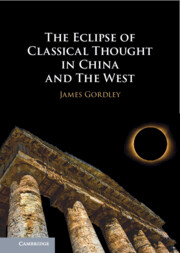Book contents
- The Eclipse of Classical Thought in China and the West
- The Eclipse of Classical Thought in China and the West
- Copyright page
- Dedication
- Contents
- Acknowledgments
- 1 The Dilemma
- Part I Two Ancient Traditions
- Part II The Formation of Two Constitutions
- Part III The Eclipse of Classical Thought
- 10 Neo-Confucianism
- 11 The Path to Orthodoxy
- 12 The Rise and Fall of Western Rationalism
- 13 The Search for Alternatives
- 14 Conclusion
- Appendix The Encounter with the Abrahamic Religions
- Index
14 - Conclusion
from Part III - The Eclipse of Classical Thought
Published online by Cambridge University Press: 26 July 2022
- The Eclipse of Classical Thought in China and the West
- The Eclipse of Classical Thought in China and the West
- Copyright page
- Dedication
- Contents
- Acknowledgments
- 1 The Dilemma
- Part I Two Ancient Traditions
- Part II The Formation of Two Constitutions
- Part III The Eclipse of Classical Thought
- 10 Neo-Confucianism
- 11 The Path to Orthodoxy
- 12 The Rise and Fall of Western Rationalism
- 13 The Search for Alternatives
- 14 Conclusion
- Appendix The Encounter with the Abrahamic Religions
- Index
Summary
Aristotle said that the only way to establish first principles is by dialectical argument. This book has presented an extended dialectical argument. We have seen how modern philosophers have tried to justify liberal institutions. Some did so by attaching a normative value to pleasure or preference satisfaction. Yet it is hard to believe that all pleasures or preferences are worthwhile. Some embraced what we have called a principle of universal concern: one must apply the same standard to others as to oneself. They had trouble explaining what that standard should be. Some attached a normative value to self-expression but then they had to explain why, in itself, self-expression is of value.
- Type
- Chapter
- Information
- The Eclipse of Classical Thought in China and The West , pp. 331 - 336Publisher: Cambridge University PressPrint publication year: 2022

